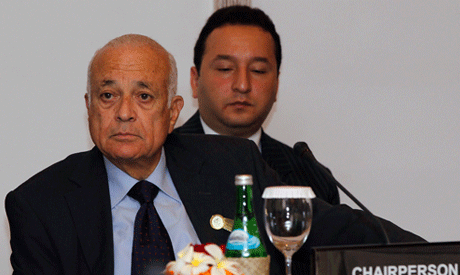
Egypt's Foreign Minister Nabil Abdalla El Araby leads a meeting of the Committee on Palestine on the second day of the 16th Ministerial Conference of the Non-Aligned Movement (NAM) in Nusa Dua on Indonesia's resort island of Bali (Photo: Reuters)
Foreign Minister Nabil El-Arabi met in the Indonesian capital of Bali today with his Iranian counterpart, Ali Akbar Salehi "on the fringe of" a meeting for the Non-Aligned Movement (NAM).
"The ministers met as part of the NAM Troika in which Cuba, Egypt and Iran are members," according to a press release issued by the office of the foreign minister spokesperson.
The spokesperson, Menha Bakhoum added that El-Arabi and Salehi "exchanged views on a number of issues that fall within the domain of multilateral diplomacy and underlined continued cooperation in the context of NAM" whose chairmanship will be passed from Egypt to Iran next year.
The press release made no reference to the issue of bilateral relations between Egypt and Iran.
However, in press statements he made in Bali, El-Arabi said that he informed his Iranian counterpart of Egypt's intention to turn a new page in its relations with Iran. That said, El-Arabi added that no plans are in the pipeline to restore diplomatic relations between Cairo and Tehran soon.
The top Egyptian diplomat suggested that a decision on the matter might have to go through Parliament first. It is not clear when Egypt's next parliament will be elected but according to announcements made to date, they will be held this autumn.
Upon his assignment in March, El-Arabi announced Egypt’s intention to restore diplomatic relations with Iran.
Relations between Cairo and Tehran were severed in 1979 by the Islamic Republic of Iran. Since then several attempts have aimed to mend the diplomatic rift but none succeeded.
During the rule of ex-president Hosni Mubarak two attempts neared completion – one in 1997 and a second in 2004 – but both diplomatic demarches were cut off by an Egyptian intelligence veto.
A last breakthrough under the Mubarak regime occurred last fall when Egypt Air signed an agreement for cooperation with its Iranian counterpart. Then as well, a security veto blocked the operation of the agreement that had been facilitated by one of Mubarak's closest aides.
"Today, despite the keen effort of Minister El-Arabi there are many quarters that still have concern over the resumption of full diplomatic relations," said an Egyptian official. He added that the concerns are still largely expressed in security quarters that fear Iranian attempts to intervene into Egyptian politics at this particularly volatile moment.
However according to an Egyptian diplomat, the foreign minister, who is leaving his briefly held post as top diplomat on 1 July to be secretary general of the Arab League, is still pushing to resume relations and is "hoping to see something happen before he leaves."
El-Arabi said he is not pursuing strategic relations with Iran, merely the normal relations that all countries except the US and Israel have with Tehran.
Particularly apprehensive about the new Egyptian policy orientation are the member states of the Gulf Cooperation Council. Cairo has offered assurances that it has no intention of moving back on its commitment to observe the requirements of the GCC security parameters but argues that normal diplomatic relations with Tehran do not constitute walking back on that commitment.
Washington is also concerned, and according to Egyptian diplomats has raised a few questions with Egyptian officials on the matter.
In Cairo today, US Assistant Secretary of State Jeffery Feltman said "Egyptians know very well the type of problems” Iran causes in the region. He added that Egyptians know as well that the Iranian leaders are denying Iranian people the type of democracy Egyptians are now getting, and as such the US is not "very concerned" over Cairo's decisions regarding its relations with Tehran.
Cairo and Tehran currently exchange diplomatic missions – a level of diplomatic relations in between interest sections and embassies.
Short link: